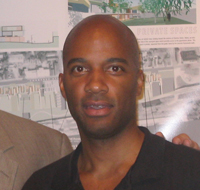Kelvin Sealey: Breaking New Ground
The architect of the course that took TC and Columbia students to New Orleans is a change agent who abhors a void He's probably best known around TC as the guy who hosts that cool live talk-show series that's had Cornel West, Gloria Steinem, Frank Gehry and Edwidge Danticat as guests. But his work on the show Project Citizen doesn't begin to describe the breadth of Kelvin Sealey's activities at TC and Columbia.
He's probably best known around TC as the guy who hosts that cool live talk-show series that's had Cornel West, Gloria Steinem, Frank Gehry and Edwidge Danticat as guests. But his work on the show Project Citizen doesn't begin to describe the breadth of Kelvin Sealey's activities at TC and Columbia.
The indefatigable Sealey also is the creator of TC's Film Research and Education Association (FERA), a doctoral student in Interdisciplinary Studies and a technology specialist working for the College's Center for Educational Outreach and Innovation (CEO&I), which, with Professor Judith Burton, sponsored the trip he led to New Orleans in February.
"Kelvin has offered courses for three years through CEO&I that are consistently well conceived and executed," says Ann Armstrong, Executive Director of CEO&I. "With his emphasis on teaching to real-world needs, the education crisis in post-Katrina New Orleans was perfect for combining architecture and education with a pedagogically unique opportunity for our students."
Perhaps the common thread, underlying everything Sealey does, is his focus on designing learning environments, the subject of his TC master's thesis. In fact, prior to coming to TC, Sealey, who founded a successful real estate development firm in the 1980s, served as a teacher and then dean of the upper school at Packer Collegiate Institute in Brooklyn for three years. He later started a grant-making nonprofit organization that supports people in the arts and education and then, more recently, a technology firm.
When he came to TC in 2002 to work on his Ed.D., he took classes all over the university, including Columbia University's Graduate School of Architecture, Planning and Preservation (GSAPP). After taking classes at GSAPP, Sealey was introduced to Mark Wigley, now Dean of GSAPP, and proposed inviting architect Frank Gehry to speak at a Project Citizen event.
"Wigley came to understand that my interest in architecture was theoretical and introduced me to an architect in school design," said Sealey. That architect was Scott Marble. Together, they created the Design Lab for Learning Organizations and, through that, the course they teach together at GSAPP and TC. Students from both schools are studying the topic together-'"including, notably, a high percentage of students from TC's Klingenstein Center, a center dedicated to independent school leadership.
In February, Sealey and Marble's students joined two other classes from GSAPP on a trip to Tulane University in New Orleans.
"As everyone who has been to New Orleans since Katrina says, you cannot understand the scale until you see it," says Sealey. "The mind has no reference."
As a result of the trip, Sealey says the class has redoubled its efforts and is planning a second trip to meet with school administrators and to find sites to work on with the city. The class is working with education architect Steven Bingler, author of Schools As Centers of Community: A Citizen's Guide for Planning and Design (U.S. Department of Education, 2000) and who visited the class in February.
Why focus on New Orleans? Partly because it brings into sharp focus all the school and community planning issues that, to some degree, face every major urban center in the U.S. But for Sealey, there's also another reason.
"Maybe it is because we are part of Columbia University or the fact that our colleagues at Columbia have contacts in New Orleans, but the level of access we gained to people in positions of power reinforced to me not just the necessity, but the imperative, to use that access to do some good," he says. "To whom much is given, much is required. As TCers and Columbians, we have been given much and much is required of us."
TC Dean Darlyne Bailey agreed. "Much work is required to help the victims of Hurricane Katrina rebuild their communities," she said. "TC students and faculty have a long history of responsibility toward local, national and global needs in education and helping the people of the Gulf Coast region in their time of need is a moral imperative we can't ignore. TC people like Kelvin and his students are our ambassadors to the educators of New Orleans."
Published Tuesday, Apr. 25, 2006
